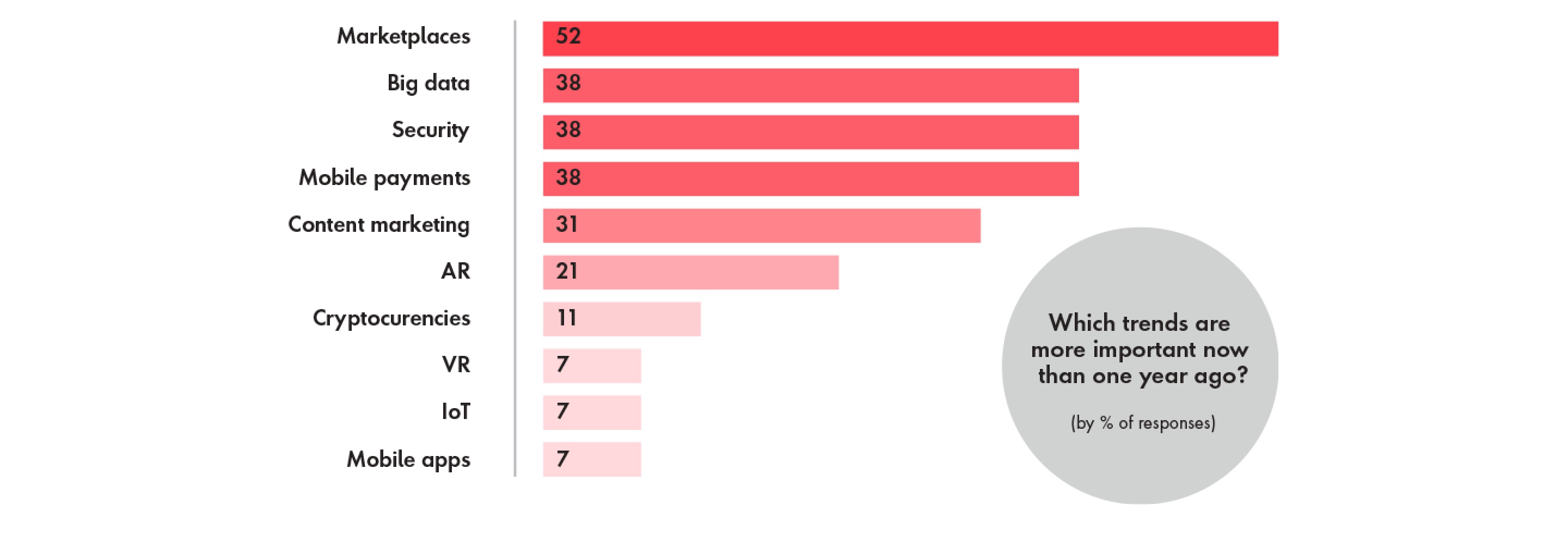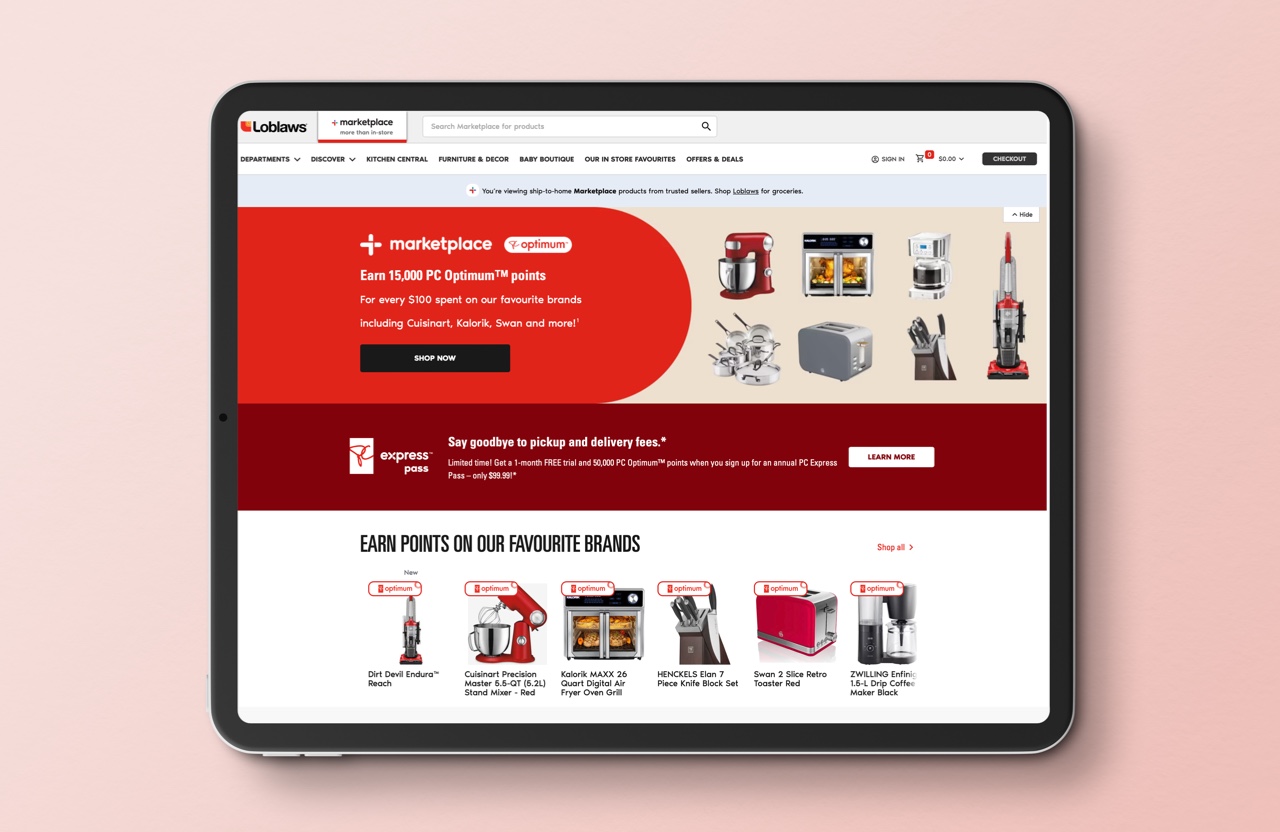What issue can we solve for you?
Type in your prompt above or try one of these suggestions
Suggested Prompt



Telecommunications, Media & Technology
Marketplaces: Where Competitors Become Commerce Comrades
Marketplaces have been around for centuries. Some claim that they date back to when people first began trading. Back then, farmers and artisans would sell their wares at a marketplace and people would conveniently buy all the products they needed in one central location.
Fast forward to today and marketplaces are alive and well. Many competitive products sit on shelves next to each other where consumers are able to compare and contrast in a single environment. In the digital world that is marketplaces -- and it’s what consumers are inclined toward. In fact, digital marketplaces are growing in scope and relevance as they represent the next wave of e-commerce.
Most important 2021 eCommerce trends

Because the adoption of digital devices and consumer tech products happen over a period of time, the customer is often left to solve these problems themselves without the support needed to navigate an often confusing and disconnected world. Consumer tech marketplaces offer a platform for multiple vendors to sell products online to an audience of buyers. Brands partner with their competitors to create online marketplace experiences that generate new business value and provide a variety of reliable and connected products for their customer base.
There are three main players within marketplaces: operators, sellers, and buyers. Operators have greater control over competitor data and earn a commission from products sold. Sellers have an opportunity to sell to a broader customer base and access data from the ecosystem to better understand buyer behavior. And lastly, customers have access to a variety of curated products and confidence that those products will work within their current product ecosystem. Research indicates that 66% of US adults say that marketplaces help them locate items available for purchase that they otherwise wouldn’t have found.
Choosing the right marketplace method
Marketplaces can supplement ecommerce models and generate additional avenues for company expansion and revenue growth. Brands that first assess and identify their marketplace business case and examine the competitive landscape can better inform their decision to join a marketplace or build their own.
In a third-party marketplace, a business can sell its products on another operator’s marketplace while taking advantage of their traffic and customer base. The third party provides buyers and the transactional infrastructure. This makes it easy to just show up and sell. These types of marketplaces run the gamut from mega marketplaces, like Amazon and Alibaba, to niche marketplaces that serve specific audiences and product categories and related offerings.

Publicis Sapient built an integrated marketplace experience for Loblaw, a large Canadian Grocer. In partnership with Loblaw, PS launched a discovery-driven shopping experience for the core marketplace categories on its existing grocery platform, which has enabled double-digit growth and the addition of numerous 3P sellers since launch.
Some businesses choose to build their own first-party marketplace where they design, host and operate the site while sellers list products and handle fulfillment. This allows a business to maintain control of the customer experience and data, along with brand appearance and representation. With access to customer data, first-party marketplace operators can better inform a wide variety of business opportunities, including product expansion and identifying areas to target marketing based on purchase history. There is also greater ease of integration with loyalty programs and less channel conflict.
What is holding back some business?
Those partnering in a marketplace may have overlapping products, so why would they want to be selling on the same site? Organizations fear what happens on large behemoth marketplaces: products are duplicated and brands are undercut on price.
Some organizations worry that their “frenemies” will cannibalize their sales from one channel to another. Sharing data is a scary thing, but the rewards can outweigh the risk. Sharing data is indeed a core benefit of a marketplace. It enables a sense of transparency about pricing and profit.
Additionally, marketplaces don't always have to be competitive. There are groups of products that are contemplated and even purchased together in certain instances, but that don't necessitate navigating a competitive perspective. With the right rules and governance measures in place, businesses can be integrated, collaborative and successful as a marketplace.
Building a marketplace is not enough
A successful marketplace requires much more than spinning up an ecommerce site. First and foremost, a business must outline the business case, operating model and competitive risks. Once this strategy is established, several questions must be answered: Which players in the ecosystem should be part of the marketplace? What journeys are their customers on? How will data be shared and governed? How can the marketplace minimize friction among competitors?
Unlike other platform partners, we help build marketplaces from strategy to shaping the solution, to implementation. We have the experience stitching the commerce, order management systems and marketplace platforms together to create industry-leading solutions.
Publicis Sapient brings experience and expertise across all components of building a marketplace.

We have approximately 200 – 250 people globally with marketplace experience across these services.
The race is on
E-commerce sites are competing to increase customers, sellers, orders, and distribution. This has become incredibly difficult to do alone.
At the same time, customer preferences are changing fast. Buyers will soon choose their preferred buying approach, based on the solution that provides the best customer experience, purchasing economics, advice, and support. Marketplaces deliver this advantage.
Ultimately, it comes down to value for the customer. How do consumer tech brands continue to create value and truly empathize with the journey they're on to adopt and continue their product adoption? Brands should think creatively through the lens of marketplaces to meet customers along the broader journey they may be on, making their lives easier and remaining laser focused on delivering value.
Between the option to buy direct from providers, or to participate in retailer or third-party marketplaces, the industry player that attracts the most critical mass will establish itself as a leader, not only in transactions, but also collection of customer data and insights that can lead to new offerings.
To learn more about which marketplace solution may be right for you, or to explore how a marketplace can benefit your business:
Start a Conversation
Related Reading
-
![]()
Article
Welcome to Marketplaces: The Next Evolution in E-Commerce
Learn three ways to capture marketplace opportunities and generate new revenue by using data to your brand’s advantage.
-
![]()
Article + PDF
Top 5 Questions About Consumer Tech Marketplace Strategy
Download our Guide to Next eBook to find the right Consumer Tech marketplace strategy for your organization.
-
![]()
Partnership
PS & Salesforce
As a long-term Salesforce partner, Publicis Sapient has delivered over 1,800 projects globally, leveraging the best technology coupled with the most qualified and specialized Salesforce consultants in the market to drive innovation and results.







